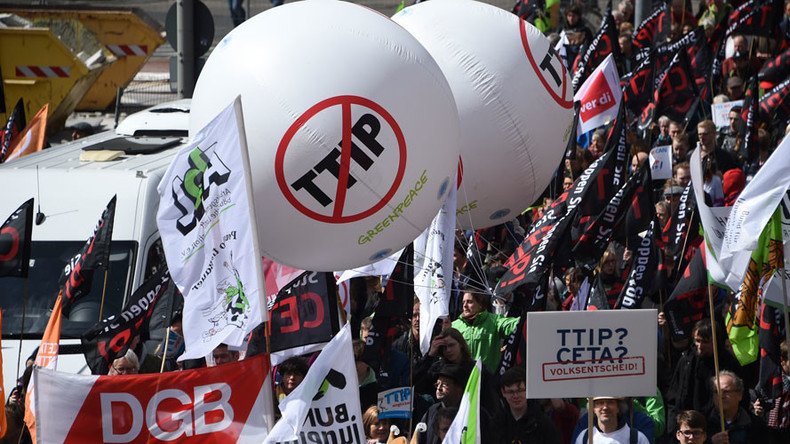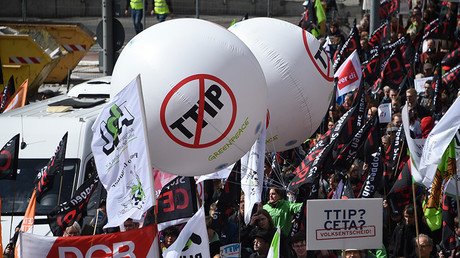70% of Germans oppose TTIP, survey says

Seventy percent of Germans oppose the TTIP trade treaty, according to a new poll. The news comes after France said it is against signing the deal amid a scandal over leaked documents revealing negotiations between US and European officials.
The survey, conducted by German broadcaster ARD, found that 70 percent of participants believe the Transatlantic Trade and Investment Partnership (TTIP) has more disadvantages than advantages.
Seventy-nine percent said they believed the agreement would hurt consumer protection, while 83 percent expressed dissatisfaction with the secretive way in which the government handled negotiations on the deal.
Meanwhile, only 17 percent said they consider the deal to be advantageous for Germany, while 13 percent said they didn't know, or had no position.
The poll results show a marked hemorrhaging of support for TTIP since 2014, when a similar survey found that 55 percent of Germans viewed the deal negatively.
The drop in support for the deal is even sharper in the US, despite President Barack Obama's support for the agreement. Only 18 percent of Americans believe TTIP is a good thing, compared to a sizeable 53 percent in 2014.
Meanwhile, the British government's assessment of the proposed deal is similar, stating that there are “lots of risks and no benefit,” according to documents seen last month by Global Justice Now.
The TTIP deal has been controversial since its conception. Supporters such as Obama stress that it would create the world's largest free-trade zone. They say it would form a more integrated marketplace and help small businesses by opening up markets and making customs processes easier. They also say it would reduce trade tariffs on products.
However, many Europeans say the TTIP would place corporate interest above nations’ and workers’ interests, arguing that international corporations would be given power at the expense of small and medium-sized businesses. The secrecy surrounding the talks has also come under severe criticism.
The German survey results come just three days after Greenpeace Netherlands published leaked documents that suggest that climate protection, jobs, food safety, and online privacy rights will be whittled away under the deal. The negotiation texts were obtained from an unknown source.
That same day, French President Francois Hollande said that his country had problems with the TTIP deal, as it goes against the nation's “essential principles.”
“We will never accept questioning essential principles for our agriculture, our culture and for the reciprocity of access to public [procurement] markets,” Hollande said at a meeting of Socialist Party politicians in Paris, according to AFP. “At this stage [of talks] France says, ‘No.’”
France's trade minister, Matthias Fekl, said that Washington was unwilling to budge on several points, calling its behavior “unacceptable.” He stressed that Europe is offering a lot, but receiving very little in return.
"In view of the United States' state of mind today, that seems to be the most likely option," Fekl told Europe 1 radio, responding to whether he believes the TTIP negotiations were in danger of collapsing.
Obama recently pushed the proposed deal during a visit to Germany in April, citing Chancellor Angela Merkel's support for the agreement.
“Angela [Merkel] and I agree that the United States and the European Union need to keep moving forward with the Transatlantic Trade and Investment Partnership negotiations," he said during a joint press conference with the German chancellor.
Protests against the TTIP have been taking place for months, with a recent demonstration in Hannover during Obama’s visit to the city brining many thousands to the streets.
In order for TTIP to come into force, all 28 EU member states and the European Parliament have to ratify it. However, that possibility seems increasingly unlikely, following France's skepticism. Negotiations on the deal have so far consisted of 13 rounds of talks spread across three years.














